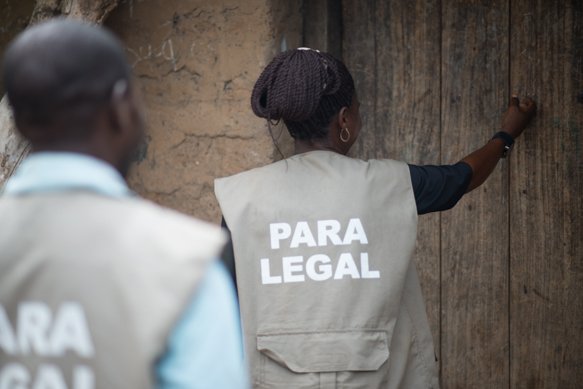LEGAL AID
LEGAL SERVICES IN THE CRIMINAL JUSTICE SYSTEM
GJG practitioners have consistently worked for the development of cost effective legal services to be made freely available in the same way as are primary health care services.
FROM DEVELOPING THE SERVICES LOCALLY…
Our practitioners innovated the Paralegal Advisory Service (Malawi) to provide a response to poor people in need of legal services on the front line of the criminal justice system (ie in police stations, prisons and courts of first instance). We then assisted in the introduction of the scheme in Kenya, Uganda, South Sudan, Sierra Leone, Enugu state in Nigeria, Zimbabwe and Bangladesh and have seen features of the scheme implemented in South Africa, Liberia, Zambia and Pakistan.
The PAS has been operating (with continued DFID support) in Malawi since 2000 and is widely seen as an international good practice. Its simplicity and flexibility have facilitated its remarkable uptake in new countries who have easily adapted it to their context (in Malawi, Uganda and Bangladesh the PAS has been sustained and expanded in each).
…TO DEVELOPING AN ENABLING ENVIRONMENT AT NATIONAL LEVEL…
GJG services have assisted governments draft laws, policy and strategic frameworks and evaluate their programmes in these services in Uganda, Malawi, Nigeria, Sierra Leone, Vietnam and in Bangladesh.
…REGIONAL LEVEL…
GJG practitioners organised a conference on ‘Legal Aid in Criminal Justice: the role of lawyers, non-lawyers and other service providers’ in Lilongwe, Malawi. This first pan-African conference produced the Lilongwe Declaration on Legal Aid in Criminal Justice Systems in Africa and Plan of Action, 2004. The Lilongwe Declaration was adopted by the African Commission on Human and Peoples’ Rights (2006: ACHPR/Res.100 (XXXX) 06) and by the United Nations in 2007 (Economic and Social Council. Official Records, 2007. Supplement No.10. E/CN.15/2007/17/Rev.1).
…AND AT INTERNATIONAL LEVEL
This led to an invitation to research and draft the United Nations Principles and Guidelines on Access to Legal Aid in Criminal Justice Systems which we presented at an expert meeting in Vienna in 2009. In 2013, the UN General Assembly adopted a set of these principles and guidelines.
This ‘pioneering’ work (New York Times, November 6, 2005) in developing demand-driven, affordable legal services has led to a high demand for our joint inputs. In 2013, GJG practitioners helped the British Council and GIZ raise just under GBP 30 million in grants for the provision of these services in China, Bangladesh and South Sudan.
Here is a list of publications and materials that GJG practitoners have developed with a view to enhancing access to legal services. Please click on the links to download the files.
Brochure: where there is no lawyer - explains what a paralegal is, and how paralegals work in police stations, courts, remand facilities and in prisons.
The PLC Manual 2007 - a manual for paralegals conducting paralegal aid clinics (PLCs) in prisons.
The Paralegal Advisory Service in Practice - a manual for non-lawyers working in the criminal justice system (not only in prisons).
Path to Justice - the PASI has produced this short film which explaining their model, how it can help improve access to justice and reduce the pressure on the criminal justice system.
Freedom Inside the Walls - shot in Benin, Kenya and Malawi this film provides disturbing footage of prison conditions inside these countries, which are common to many other prisons in Africa. It highlights the challenges in accessing justice faced by poor people in conflict with the law.
10 steps from arrest to appeal - a poster explaining the criminal procedure in a simple way using pictures and as little text as possible. This poster has been reproduced in many languages and modified to the laws of several jurisdictions. The poster is designed to be visible in police stations, remand facilities, and in prisons.
What is bail? - a poster explaining what bails is, and how an accused person can access it. As with the 10 steps poster, this is designed to be be visible wherever there are people who have been detained, as well as in places where family members of detained persons would be likely to see it.
Clifford Msiska, a long standing GJG associate, leads the Paralegal Advisory Service Institute (PASI) in Malawi. He is one of the world's leading experts on the provision of primary justice services. In the video clip below he asks the question; 'how can we create legal aid delivery scheme which practical, which is affordable, and which is effective? That is the main question.' He then goes onto explain how PASI helps deliver a system that meets those criteria.


